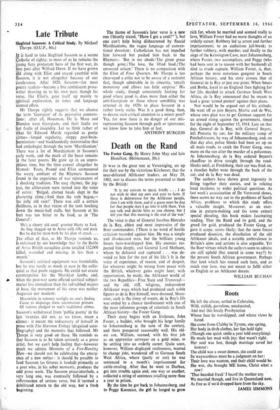Death on the Rand
IT WAS in the great tent at Vereeniging, set up for their use by the victorious Kitchener, that the near-defeated Afrikaner leaders, on May 29, 1902, met to discuss the terms presented to them by the British: `It is my custom to speak briefly . . . I do not wish to shut my ears and eyes to facts. If there is deliverance for the Afrikaner people, then I am with them, and if a grave must be dug for that people then I go into it with them. You can talk and decide here as you choose, but I tell you that this meeting is the end of the war.'
The voice is that of General Jacobus Hercules de la Rey, ablest and most impressive of the Boer commanders. (There is no word of hostile criticism recorded against him. He was a simple and ill-educated man, but the brilliant young Smuts hero-worshipped him. His enemies res- pected him deeply, and General Lord Methuen, whom he defeated and captured . . . was de- voted to him for the rest of his life.') It is the voice of experience, of reason, and of despair, for whatever might be wrung from peace with the British, whatever gains might later, with opportunism, be made, the Afrikaner world of the two Republics—Free State and Transvaal— and the old, stiff, religious, independent Afrikaner ways which had produced such noble figures as de la Rey himself, were doomed. More- over, such is the irony of events, de la Rey's life was ended by a chance involvement with one of the most infamous groups of criminals in South African history—the Foster Gang.
Their story begins with an Irishman, John Foster, a builder, who brought his large family to Johannesburg at the turn of the century, and there prospered reasonably well. His eld- est son, William, seemed, with his first job as an apprentice surveyor on a gold mine, to be settling into an orderly career. Quite soon, however, William displayed restlessness, wanted to change jobs, wandered off to German South West Africa, where (justly or not) he was sentenced to a month's impri'sonment for cattle-stealing. After that he went to Durban, got into trouble again and, one way or another, collected a string of sentences totalling more than a year in prison.
By the time he got back to Johannesburg, and to Peggy Korenico, the girl he longed to grow rich for, whom he married and seemed really to love, William Foster had no more thoughts of an orderly career. Robbery led to arrest and further imprisonment; to an audacious jail-break; to further robbery, with murder; and finally to the siege of the Kensington Cave, near Johannesburg, where Foster, two accomplices, and Peggy (who had been sent in to reason with her husband) all died to evade capture. William Foster, is, then, perhaps the most notorious gangster in South African history, and his story crosses that of General de la Rey at just one point. When Smuts and Botha, loyal to an England then fighting for her life, decided to attack German South West Africa, de la Rey announced that he meant to lead a great 'armed protest' against their plans.
Nor would he be argued out of his attitude. He went off to join Beyers, Moritz and de Wet, whose own plan was to get German support for an armed rising against the government, timed for the night of September 15, 1914. Late on that day, General de la Rey, with General Beyers, left Pretoria by car, for the military camp of Potchefstroom, by way of Johannesburg, and, on that day also, police blocks had been set up on all main roads, to catch the Foster Gang, once more on the run after the murder of a policeman. At Johannesburg, de la Rey ordered Beyers's chauffeur to drive straight through the road- blocks until, at Fordsburg, their car was fired on, a ricochet bullet went through the back of the car, and de la Rey was dead.
The authors have shown great ingenuity in fitting together their stories, and in relating local incidents to wider political questions. As last week's assassination of Dr Verwoerd shows, there seems no way out to the problems of South Africa, problems to which this study offers a valuable insight. Moreover, as an exer- cise in pattern-making and (to some extent) special pleading, this book makes fascinating reading. That the Rand and its gold, and the greed for gold, produced the Foster Gang, or gave it scope, seems likely; that the same forces produced disunion, the dissolution of the old Afrikaner ideals, and a notable ambivalence in Britain's aims and actions is also arguable. Yet the Boer virtues which the authors seem to admire are still upheld (but soured in some way?) by the present South African government. Perhaps that land which has roused such lusts, and so much true love, was not meant to fulfil either an English or an Afrikaner dream.
WILLIAM BUCHAN


































 Previous page
Previous page